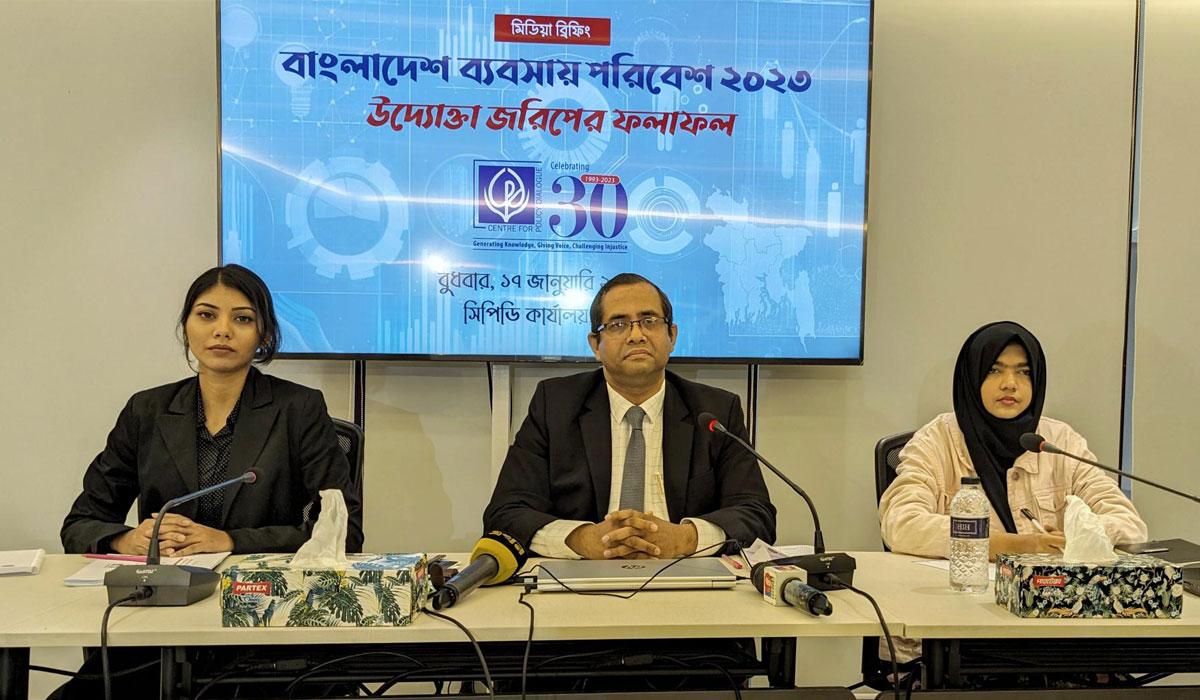
The post-pandemic business environment in Bangladesh reflects a combination of progress, stagnation, and challenges across various sectors. Persistent issues such as corruption, compounded by government bureaucracy and foreign currency instability are creating hurdles for business owners. Companies are facing difficulties in various aspects such as international transaction, opening Letters of Credit (LC) and managing import payments. Financial sector indicators have consistently shown negative trends in recent years, posing challenges for obtaining equity funding and accessing finance, especially for Small and Medium-sized Enterprises (SMEs). There is a perceived strain on macroeconomic stability. While larger businesses recover from the production shock induced by the pandemic, more than one-third of small-scale businesses continue to experience a decline in production.
These observations emerged at a media briefing on ‘Bangladesh Business Environment Study 2023: Findings from the Executive Opinion Survey’, organised by the Centre for Policy Dialogue (CPD) on Wednesday, 17 January 2024. CPD presented the findings from the ‘Executive Opinion Survey (EOS)’ which had been carried out as part of CPD’s partnership with the World Economic Forum (WEF).
During the keynote presentation, Dr Khondaker Golam Moazzem, Research Director, CPD, underscored the findings of the survey and said ‘The economy is at high risk of energy supply shortage, high inflation, economic downturn, inequality, and unemployment.
He highlighted that the key indicators in research and technology show a declining trend, with limited business-university collaboration in Research and Development (R&D). The adoption of crucial technologies such as Artificial Intelligence (AI), robots, quantum encryption, and space technologies remains limited.
The Research Director recommended strengthening institutional mechanisms to combat corruption. He highlighted the commonality of bribes in various sectors and emphasised the need for easily accessible digital payment systems to address the issue. The new government, in line with its election manifesto, should disclose strategies for addressing corruption in public procurement, registration, licensing, permissions, and official orders.
‘The government should now focus on attracting Foreign Direct Investments (FDIs), increasing export competitiveness, and channeling inward remittance flow through formal channels by adopting a market-based exchange rate policy to help the business owners’ suggested Dr Moazzem.
He urged ‘The government should extend its support to SMEs by easing access to finance and customising fiscal instruments such as tax breaks and subsidies for specific sectors impacted by the pandemic’. Furthermore, the government should implement loan guarantee schemes with lower collateral requirements and easier application processes for SMEs. The new government should disclose its strategy for addressing the challenges through concerned ministries and departments.
Urgent measures are needed to restore disrupted macroeconomic stability in recent years. A nuanced monetary policy, supported by fiscal measures, is crucial to control inflation and boost the supply of dollars.
To foster digital literacy, policies such as providing affordable access to technology and training for SMEs to leverage e-commerce and online platforms should be implemented. Furthermore, creating research and development hubs to incentivise collaborative projects between universities and businesses is needed.
The briefing was followed by a Q&A session with journalists from print and electronic media. In response to queries, the Research Director highlighted that the enhanced business capacity has empowered some to overcome challenges and progress, yet a deficiency in inclusivity persists. Failure to address current challenges in the business environment may exacerbate inequality, further benefiting large enterprises and reinforcing corporate dominance in Bangladesh.



